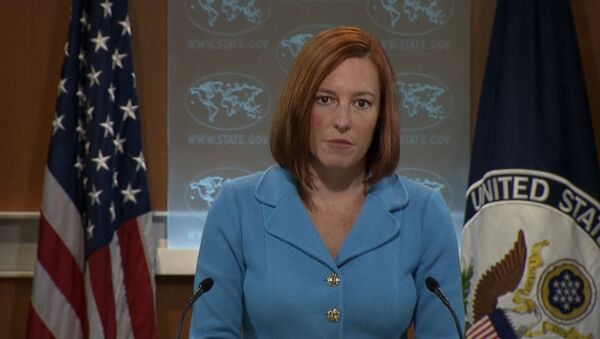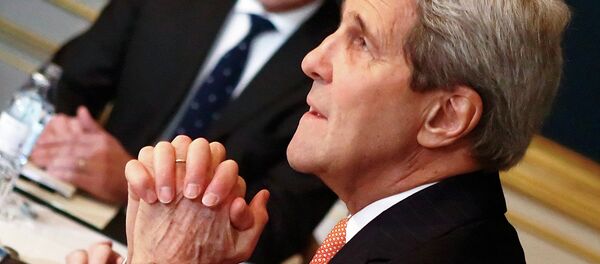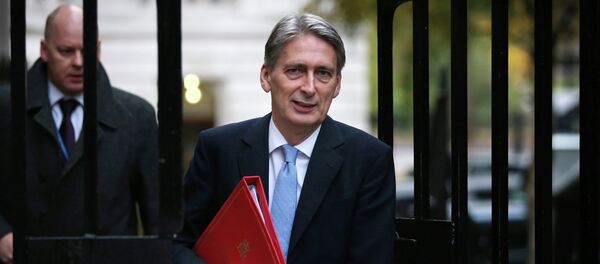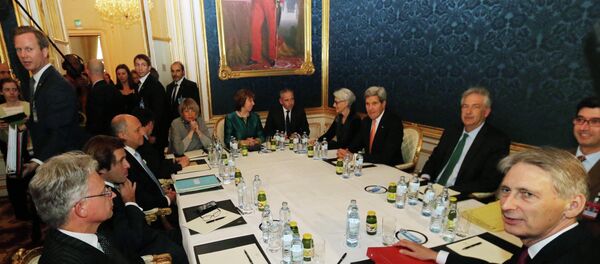WASHINGTON, December 2 (Sputnik) – Tehran and the P5+1 group of international negotiators plan to discuss Iran’s nuclear program later in December, US Department of State spokesperson Jen Psaki stated during the press briefing on Monday.
“As Secretary [John Kerry] and others mentioned in their remarks before we left Vienna, and others left Vienna, the plan was for the teams to meet again in December,” Psaki said.
Psaki noted that so far there are no details on a new meeting.
“That [date] has not been set yet, but we are working certainly to set that date and location,” she said. “We certainly remain in touch with our P5+1 partners in the meantime.”
The latest round of talks on the Iranian nuclear issue between Tehran and the P5+1 group that includes Russia, the United States, the United Kingdom, France, China and Germany, finished in Vienna on November 24. The participants agreed to extend the deadline for reaching the deal until July 1, 2015 with a very specific goal of finishing the political agreement within four months and to resume negotiations in the next few weeks.
The group hopes to strike a comprehensive long-term nuclear deal with Tehran, guaranteeing the peaceful nature of the Iranian nuclear program. An interim agreement was reached during P5+1 talks in Geneva in November 2013.
The West has accused Iran of developing nuclear weapons under the guise of civilian activities, though this has been repeatedly denied by officials in Tehran, who claim the country’s nuclear development is peaceful in nature and aimed at satisfying Iran’s energy needs.
US to Act if Russia-Iran Economic Cooperation 'Sanctionable'
Moscow-Tehran economic collaboration can lead to sanctions, Jen Psaki said.
“We are aware of the talks between Russia and Iran, involving various areas of planned future economic cooperation,” Psaki stated. “If there are deals that are sanctionable, we will act.”
She noted that they don’t have specific details now, and so cannot “determine sanctionability in the abstract.”
“We’ll continue to monitor developments and these discussions about future activities,” Psaki concluded.
Psaki also noted that Iran still remains closed for any business, when asked about Washington’s position on the interest of some countries to return to Iran’s car market.
“Iran is not yet open for business. I think that’s obviously still the case,” she said.
Russia and Iran have a long history of economic, geographic, and political interaction.
During a meeting held in September, Russian President Vladimir Putin and his Iranian counterpart Hassan Rouhani agreed to further expand cooperation between the countries, including technological and commercial enterprises.
Earlier in November, Iranian ambassador to Russia Mehdi Sanaei confirmed that Tehran aims to deepen relations with Moscow.
Tehran has been a target of sanctions, imposed by the UN Security Council, as well as the European Union, the United States, and several other countries over the allegations that Iran was trying to produce nuclear weapons. The Iranian government has denied the allegations and said that its nuclear program was peaceful and developed to meet the country’s growing energy needs.
Last year, Iran and the P5+1 group that includes Russia, the United States, the United Kingdom, France, China and Germany agreed to strike a long-term deal that would guarantee the peaceful nature of the Iranian nuclear program.
On November 24, which was planned as a deadline for reaching a deal, the participants agreed on extension until July 1, 2015 with a very specific goal of finishing the political agreement within four months.





